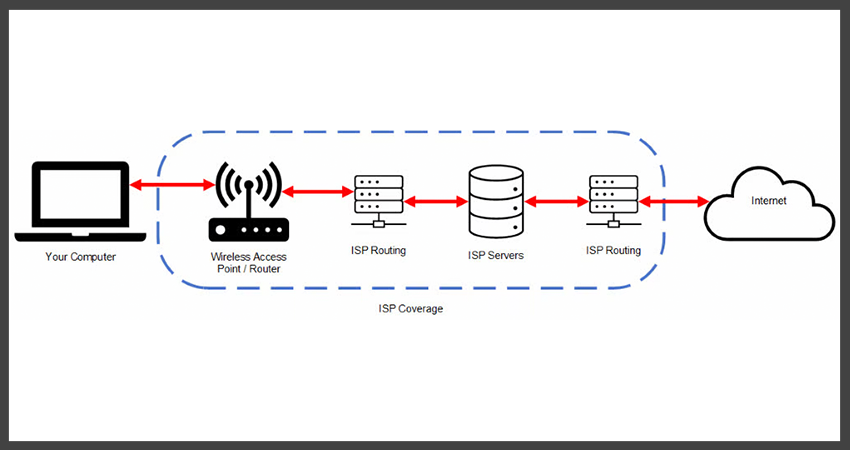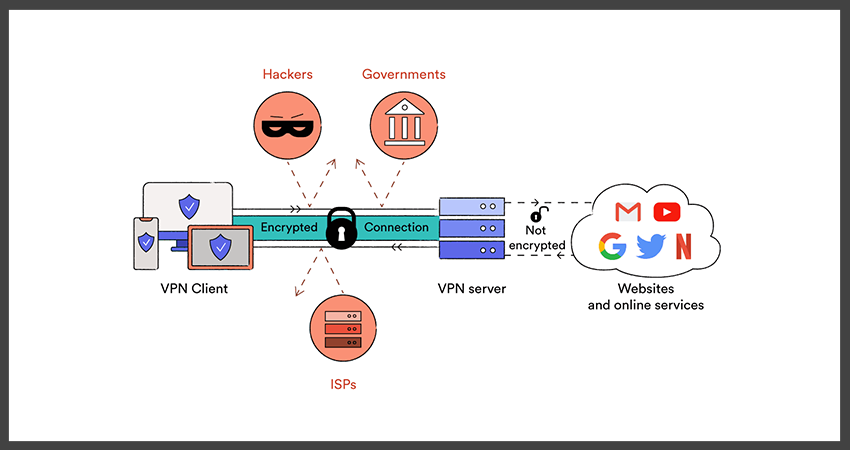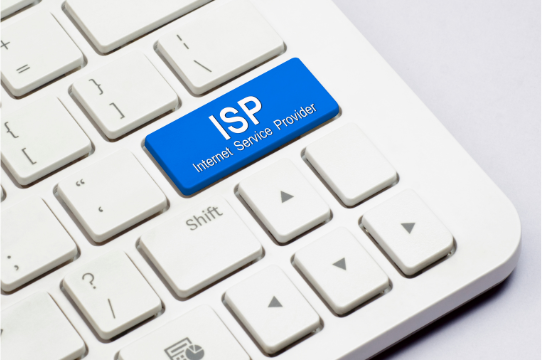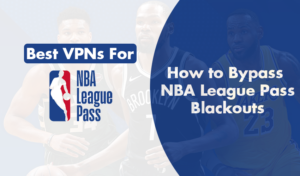The digital era, while ushering in numerous conveniences, has also heightened concerns about internet privacy and data security. One question that often intrigues internet users about their privacy is: Can your internet provider spy on you?
The short answer is yes, your Internet Service Provider (ISP), has the potential to monitor your online activities. But what can your ISP see? Can the internet provider see your history or your search results? Can your ISP see your browsing history? These are pressing questions in the minds of many internet users.
This comprehensive guide aims to shed light on these queries, examining the depths of ISP privacy, the potential for ISPs to track your online history, and how to protect yourself from unwarranted tracking.
Understanding the Role of Internet Service Providers (ISPs)
An Internet Service Provider (ISP) is a company that provides you with access to the internet. ISPs can be privately run or community-owned, and they may offer additional services such as email accounts, telephone, and television services.

However, the infrastructure of their technology enables them to track and log your online activity by default.
The Extent of ISP Tracking
The next question that arises is: how much can your ISP really see? The answer is that your ISP can track and log almost everything you do online. This data logging includes the websites you visit, your online searches, the files you download, the emails you send and receive, and even your passwords.
This tracking occurs each time you enter a search query into a search engine or visit a URL, revealing your internet history and activity.
The extent of ISP tracking is not restricted to merely observing your internet behavior. ISPs can also discern the type of content you are consuming, whether it’s video streaming, online gaming, or simple web browsing.
They can trace the devices you use to connect to the internet, and even identify the operating system and browser type on those devices.

This comprehensive data collection allows ISPs to create detailed user profiles of online habits.
It is important to note that ISP tracking is not always invasive or malicious. It can serve legitimate purposes such as network management, where ISPs monitor network traffic to ensure smooth operation.
ISPs can also use data to provide personalized services and targeted advertising, which some users may find beneficial.
However, the potential for misuse of this private data raises significant privacy concerns. There have been instances where ISPs have sold user data to third parties without explicit consent from users.
While regulations such as General Data Protection Regulation (GDPR) in Europe and California Consumer Privacy Act (CCPA) in USA have been established to protect user privacy, they are not globally enforced. This means that for many users around the world, ISP tracking continues unregulated.
Why ISPs Track Your Data
ISPs track your data for several reasons. The most official reason given is to “improve the user experience.” However, there are also other underlying reasons why your internet provider may track websites you visit:
- Data Retention Laws: In many countries, ISPs are legally required to collect and retain customer data for a specific period. This data could include browsing history, location, social media messages, credit card information, and more.
- Advertising: ISPs can profit by selling your data to advertisers. Online marketing is data-driven, and advertisers will pay a hefty amount for the detailed information that ISPs have about you.
- Throttling Connection: If you’re using too much bandwidth for your online activities, ISPs might throttle your connection to manage data traffic and reduce congestion.
- Implementing Restrictions: ISPs may block specific websites that do not comply with the regulations of certain countries, effectively implementing internet censorship.
Understanding why ISPs track your data can help you realize the importance of protecting your internet privacy.
The Consequence of ISP Tracking
One consequence of ISP tracking is the potential sale of your demographic data to advertisers. ISPs often partner with advertising networks and sort you into a specific demographic.
This is done so that tailored ads can be pushed your way. The sale of customer data to advertisers is completely legal in some jurisdictions, such as the United States.
The consequence of ISP tracking is multifaceted. On one hand, it can be beneficial for enhancing network performance and providing personalized services.

ISPs can analyze network traffic patterns to identify bottlenecks and improve speed and reliability. They can also use the data they collect to offer tailored recommendations and advertising through their advertising networks.
However, these benefits come with significant drawbacks. The primary concern is privacy infringement. When ISPs are allowed to monitor all online activities, it opens up possibilities for misuse of private data. This is particularly concerning in a world where data is a highly valuable commodity.
Personal information can be sold to third-party advertisers or even exposed in data breaches, leading to third-party tracking and even first-party tracking.
Moreover, ISP tracking can lead to unequal treatment of internet traffic, a concept known as net neutrality. If ISPs are allowed to track our online activities, they could potentially manipulate our internet experiences by prioritizing certain types of content over others based on commercial interests.
How to Stop ISP from Tracking Your Browsing Activity
There are multiple ways to stop your ISP from tracking your browsing activity. Here are some effective methods, including secure DNS and tracker blocking for anonymous browsing:
Use a VPN with a No-Logging Policy
The choice of VPN service is crucial. While a VPN can provide privacy and security benefits, some VPN providers may log their users’ data, a practice known as data logging.

When you use a VPN service that does not have a strict no-logging policy, you’re essentially creating a second ISP. Therefore, it’s important to choose a trustworthy VPN service with a no-logging policy.
Use HTTPS Websites Only
Another simple and effective way to block ISP tracking during your web browsing is to use HTTPS websites. These encrypted websites use https encryption to secure the content on the page, effectively hiding your browsing history from the ISP.
However, while your ISP can’t see what you’re doing on HTTPS sites, they can still track your browser history, including which sites you’ve visited.
Use a Privacy Browser
Privacy browsers use private servers that encrypt your traffic, making every website you visit untraceable by anyone, including your ISP.
There are many privacy browsers available online, such as DuckDuckGo, which can hide your activities from your ISP and can be used on computers, tablets, and mobile devices, ensuring anonymous browsing and protection of your private data.
Ensuring VPN is Active on All Devices
It’s crucial to ensure that your VPN is active on all your devices to maintain secure and anonymous browsing activity.
If you fail to activate your VPN on all devices, you risk leaking your private browsing information to your ISP occasionally.
How to use a VPN to Avoid ISP Surveillance
Virtual Private Networks (VPNs) have become increasingly popular as a method for internet users to protect their privacy and security online. One of the key benefits of using a VPN is the ability to avoid ISP surveillance.
ISPs, or Internet Service Providers, have the ability to monitor and record all of your online activities. This can include the websites you visit, the data you download or upload, and even the passwords and credit card numbers you enter. Using a VPN can help mask this activity and protect your privacy.
Here are step-by-step instructions on how to use a VPN to avoid ISP surveillance:
- Choose a VPN: There are numerous VPN services available, both free and paid. Do some research to find one that suits your needs in terms of cost, reliability, and privacy policy.
- Download and Install: Once you’ve chosen a VPN service, download the software from their website or app store and install it on your device.
- Connect to a Server: Open your VPN application and connect to a server. The server location will determine where your internet traffic appears to be coming from. This is particularly useful if you’re trying to access content that is geographically restricted.
- Ensure Encryption: Make sure your VPN is encrypting your data. Most VPNs will automatically do this, but it’s always worth double-checking.
- Start Browsing: Now that your VPN is set up and connected, you can start browsing the internet with added privacy. Your ISP will only be able to see that you’re connected to a VPN, not what you’re doing online.
By following these steps, you’ll be able to use a VPN effectively to prevent ISP surveillance of your online activities.
Keep in mind that while a VPN provides increased privacy, it does not guarantee complete anonymity – always practice safe browsing habits even when using a VPN.
Will a free VPN be enough to stop ISP tracking?
VPNs function by encrypting your internet traffic and routing it through a server in a location of your choice.
This obfuscates your online activities, making it difficult for ISPs to monitor what you’re doing on the internet. While this sounds ideal, not all VPNs are created equal, especially when comparing free and paid services.
Free VPNs, while enticing due to their lack of cost, often come with their own set of limitations and risks. They often have slower speeds, data limits, and fewer available servers.
More worryingly, some free VPNs have been found to contain malware or sell user data to third parties, which could undermine the very privacy you’re trying to protect.
Furthermore, even a high-quality VPN may not completely stop ISP tracking. ISPs might not be able to see the contents of your traffic, but they can still see that you’re using a VPN and how much data you’re transferring.
In some cases, advanced techniques like Deep Packet Inspection can potentially be used to determine the type of traffic (e.g., streaming, torrenting), even if they can’t see the exact contents.
Nations Employing Internet Service Providers for Content Filtration
Internet Service Providers (ISPs), in many countries, are employed by their respective governments to censor content and filter out the material that is deemed inappropriate or in violation of the country’s rules and regulations.
This practice is seen as a way to control online information flow, prevent the spread of harmful content, and safeguard national security. However, it has also been criticized for infringing upon freedom of speech and personal privacy.
- China is perhaps the most high-profile example of this practice. The country’s “Great Firewall” is notorious worldwide for its stringent content filtration system that blocks a vast number of foreign websites and censors content that the government deems inappropriate or harmful to its political standing.
- North Korea also employs its ISPs to censor content rigorously. The country operates under a highly centralized internet system where almost all content accessible to the public is controlled and filtered by the state.
- Iran implements strict internet censorship policies, having ISPs block access to thousands of websites and platforms, particularly those related to social media and international news outlets.
- Saudi Arabia is another nation known for content filtration. Though it has loosened some restrictions in recent years, it still maintains a significant level of control over what its citizens can access online.
- Russia has recently increased its efforts to control online content. The government has passed laws that require ISPs to censor content that is considered extremist or that could incite social unrest.
- Similarly, countries like Vietnam, Cuba, and Belarus are also known for their stringent control over the internet.
These countries utilize their ISPs to implement a variety of content filtration mechanisms, ranging from blocking specific websites to using advanced algorithms for real-time content screening.
While these measures are often justified as necessary for maintaining national security or public order, they raise serious concerns about digital rights and freedom of speech in the online sphere.
Who Has Access to My Mobile Browsing History?
The question of who has access to your mobile browsing history is a significant one in the digital age. Your mobile browsing history, which includes the sites you visit, the searches you perform, and even the pages you view, can be accessed by a few entities. It’s essential to know that the information about what you do online isn’t as private as you might think.
Your Internet Service Provider (ISP) is perhaps the most apparent entity that has access to your mobile browsing history.

ISPs log this data to manage network traffic and sometimes even sell it to advertisers for targeted advertising. In some jurisdictions, law enforcement agencies can also request this information with a warrant.
The websites you visit have access to part of your browsing history as well. They use cookies to track your activity on their site and often across other sites as well. This information helps them personalize your experience, but it also means they have a record of your visits.
Third-party advertisers and search engines also have access to a portion of your mobile browsing history. They use this data to create a profile of your interests and behavior, which they then use to serve you targeted ads.
Finally, if you’re using a work phone or if you’re connected to a work network, your employer might be monitoring your activity. Many companies have policies in place that allow them to track employee internet usage on their networks or devices.
FAQs
Does my Internet provider know what websites i visit
Yes, your ISP can see and monitor the websites you visit. The primary reason for this is that all your online activities pass through them; they route all your internet traffic.
They have access to a log of all the sites you’ve visited and the time you spent on each, often referred to as “browsing history.” So, what can ISP see?
They can view everything from the websites you’ve visited, any unencrypted information you’ve entered, and even the specific times you were online.
ISPs have a vast amount of data at their disposal. Every time you go online, whether it’s to check your email, browse social media, conduct business, or stream a movie, your ISP is aware.
They know when you’re online and have a general idea of what you’re doing based on the sites you visit.
Moreover, if these sites are not secured and do not use encryption, your ISP can even see the specific pages you visit and the data you send or receive.
However, this doesn’t necessarily mean your privacy is completely invaded. Legal regulations restrict what ISPs can do with this information.
They can’t legally share or sell your browsing history without your permission. Most ISPs also have privacy policies in place that further protect your information.
Nevertheless, if absolute privacy is a concern for you, there are ways to browse the web more anonymously and prevent your ISP from seeing your activities.
Using encryption services like Virtual Private Networks (VPN) or browsing in incognito mode can help conceal your activities from your ISP to an extent.
Does duckduckgo hide from ISP
DuckDuckGo is a popular search engine renowned for its privacy-focused features. It provides users with an option to search the internet without their activities being tracked or their personal data being collected. However, the question often arises, “Does DuckDuckGo hide from ISP?”
While DuckDuckGo provides a higher level of privacy compared to other search engines, it is crucial to understand that it does not inherently conceal your internet activities from your Internet Service Provider (ISP).
Your ISP still has the potential to see what websites you visit once you click on the results provided by DuckDuckGo. This is because DuckDuckGo, as a search engine, doesn’t have any control over the data transmission occurring between your device and the website you visit.
Nevertheless, DuckDuckGo does not store your search history or share your search details with third-party entities, which makes it a more private alternative compared to many other search engines.
But if you wish to hide your internet activities from your ISP completely, you would need to use additional privacy measures such as a Virtual Private Network (VPN) or the Tor network.
Can my online actions be concealed from Internet Service Providers through private browsing “Incognito”?
The idea of privacy on the internet is a commonly debated topic. Many users believe that using the “Incognito” mode or private browsing can conceal their online actions from their Internet Service Providers (ISPs).
However, this is a misconception. The Incognito mode primarily prevents your browsing history from being stored on your computer. It does not make your online activities invisible to ISPs.
ISPs are capable of tracking your online behavior, even when you are using private browsing or Incognito mode. They have access to your ISP browsing history because all the data you send and receive goes through their servers.
While Incognito mode prevents information from being saved to your computer, it doesn’t stop the ISP from logging the websites you visit. They can capture data such as the time you spend on a particular website, the pages you view, and your general activity patterns.
It is also worth mentioning that your IP address remains visible while using Incognito mode. This is another way ISPs can track your online actions. The IP address is like a digital fingerprint that can be used to identify a user and their online activities.
Can my ISP detect that i’m using a VPN?
The role of a Virtual Private Network (VPN) is to ensure secured and private online activities. VPNs create an encrypted tunnel for your data, preventing anyone on the same network from viewing your data.
This includes your Internet Service Provider (ISP), which typically has unrestricted access to your browsing history and online activity. However, the question often arises – can my ISP detect that I’m using a VPN?
In essence, while your ISP cannot see the contents of your internet traffic when you use a VPN, they can still recognize that you are connected to a VPN. This is because when a VPN is active, all of your traffic is directed to the VPN server.
Your ISP can see that there is data being sent and received, but they cannot decipher the content due to encryption. This is where VPN ISP privacy comes into play; although the usage of a VPN is visible, the content, destination, and origin of your online communications remain concealed.
However, it’s worth noting that not all VPNs offer the same level of security. Some may leak information that could be picked up by ISP tracking. Therefore, it’s crucial to choose a reliable VPN provider that assures no data leaks and maintains a strict no-logs policy.
Can I request my internet history from my ISP?
The question of whether you can request your internet history from your Internet Service Provider (ISP) is a complex one, largely dependent on the laws and regulations of the jurisdiction you are in, as well as the policies of the specific ISP.
In general terms, yes, it is technically possible for an ISP to provide a log of your internet history, as they have the ability to track and store such information. This includes details about the websites you visit, the times you log on and off, and potentially even more granular data.
However, it’s important to note that just because an ISP can provide this information, it doesn’t mean they will – or that they are even allowed to.
Privacy laws in many locations strictly regulate what kind of user data ISPs can collect, how long they can store it, and under what conditions they can disclose it.
For example, some jurisdictions require ISPs to delete this data after a certain period unless it’s necessary for billing or troubleshooting purposes.
Furthermore, most ISPs have privacy policies in place that prohibit them from sharing this kind of information without a user’s consent or a lawful order from a court.
Therefore, while you could technically make a request for your internet history directly to your ISP, there’s no guarantee that they would be able or willing to fulfill it.
Will my ISP know if i visit adult sites?
Internet Service Providers (ISPs) have a substantial amount of control and oversight over your online activity. They are required to manage your connection to the internet, which inherently means they have access to data about your online behavior.
If you’re wondering whether your ISP can see if you visit adult sites, the answer is yes. Regardless of the content you consume online, your ISP has the potential to view and log this information.
This is possible because each website you visit involves a request sent from your device to the server hosting the site.
Your ISP facilitates this communication and therefore can see your browsing history, including any adult sites you may visit. However, what an ISP chooses to do with this information varies by company and location.
Some may keep logs of users’ activity for a certain period of time for various reasons, including maintenance, security, or compliance with legal requests.
It’s important to note that while your ISP has the ability to see your browsing history, this doesn’t necessarily mean they are actively monitoring your every move online.
The sheer volume of data would make this an extremely resource-intensive task. Additionally, many ISPs publicly state that they respect their users’ privacy and don’t inspect individual browsing histories unless required by law enforcement.
However, if privacy is a concern for you, there are ways to keep your browsing history away from prying eyes.
One of the most common methods is using a Virtual Private Network (VPN), which encrypts your data and hides it from your ISP.
Has there been any instance of someone encountering legal problems because their Internet Service Provider disclosed their confidential information?
Internet Service Providers (ISPs) play a crucial role in our daily digital lives, connecting us to the world wide web.
However, they also have access to a vast amount of information about users, raising questions about privacy and data protection.
In terms of ISP privacy laws, several instances have emerged where individuals have encountered legal issues due to their ISPs disclosing their confidential information.
One such instance occurred in 2016 when the Federal Communications Commission (FCC) fined AT&T $25 million for what was dubbed as the largest data security breach in the history of the FCC. The breach involved AT&T’s call center employees accessing and disclosing customers’ personal data, including social security numbers and account-related data, leading to unauthorized charges on customers’ accounts.
Another case that brought attention to ISP privacy laws was when Verizon was accused of secretly inserting unique tracking headers, also known as “supercookies,” into its customers’ mobile Internet traffic without their knowledge or consent. This led to a class-action lawsuit in 2016, with Verizon settling for a $1.35 million fine.
Similarly, an incident in 2005 involving Time Warner Cable raised serious concerns about ISPs disclosing users’ confidential information. The company had mistakenly released the names and addresses of about 36,000 customers across the United States. This massive privacy breach led to a legal battle and resulted in Time Warner Cable agreeing to pay $300,000 in civil penalties.
These incidents underscore the importance of robust ISP privacy laws to protect users from unfair practices and unlawful disclosure of their confidential information.
While ISPs need user data to facilitate services, it is imperative that they adhere strictly to privacy laws and regulations in order not to compromise the trust and security of their customers.
Is my Internet Service Provider able to view what I download?
Understanding the extent of privacy when using internet services has become a vital concern for many individuals in the digital age. The question of whether an Internet Service Provider (ISP) can view what a user downloads is a common one.
The short answer is yes, ISPs have the technical ability to see what you download over their networks. They have access to a wealth of information about your online activities, including the websites you visit, emails you send and receive, video streams you watch, and files you download.
However, just because ISPs have the ability to monitor your internet activity doesn’t mean they necessarily do.
This is where ISP privacy laws come into play. In many jurisdictions, ISPs are required by law to respect the privacy of their customers’ online activities and are prohibited from inspecting the specific content of their customers’ internet traffic unless they have been issued a court order or subpoena.
Nevertheless, it’s important to remember that these protections vary greatly from country to country and even within different regions of the same country.
In some cases, ISPs may be legally allowed or even required to retain logs of their customers’ internet activity for a certain period of time.
It’s also worth noting that while ISP privacy laws may protect against your ISP directly viewing your specific downloads, they do not necessarily protect against third-party tracking by websites and online services.
Is my internet service provider disclosing my browsing history to external entities?
The question of whether your internet service provider (ISP) is disclosing your browsing history to external entities can be quite complex.
It’s important to understand that your ISP has access to a vast amount of information, including metadata and browser data, which could provide insights into your online activities.
This data can reveal the websites you visit, the time you spend online, and even the devices you use for browsing.
In many jurisdictions, ISPs are legally permitted to collect and store user data, including browsing history, for a certain period.
However, whether they share this data with external entities largely depends on their privacy policies and the legal requirements in your country.
Some ISPs may share aggregated, anonymized data with third parties for research or advertising purposes, but they should not disclose identifiable personal information without your consent or a legitimate legal reason.
Concerns about privacy have led to increased scrutiny of how ISPs handle user data. In response to these concerns, many ISPs have implemented measures to protect user privacy, such as anonymizing data or offering opt-out mechanisms for data sharing.
However, these measures are not always foolproof and may not completely prevent the disclosure of your browsing history.
If you are concerned about privacy, it is advisable to read your ISP’s privacy policy carefully to understand what data they collect and how they use it.
You might also consider using tools such as virtual private networks (VPN) or browsers with enhanced privacy settings to limit the amount of data your ISP can collect.
Is my deleted browser history visible to my internet service provider?
The question of whether or not your deleted browser history is visible to your internet service provider (ISP) is a common one, and understandably so, given the increasing concerns about privacy in the digital age.
In short, the answer is not straightforward While the specifics can vary depending on the individual ISP and the technologies they use, it is generally true that when you delete your browser history, that information is no longer readily visible on your device.
However, this does not necessarily mean that it cannot be retrieved or viewed by others, including your ISP.
Your ISP is responsible for managing your internet connection, and as such, they have access to a significant amount of data about your online activities.
This includes the websites you visit, the times you access them, and even the specific pages you view on those sites. This data is logged and can potentially be reviewed at a later date.
However, when you delete your browser history, these specific details are typically not directly accessible to your ISP.
It’s important to understand that while your ISP may not have direct access to your deleted browser history, this does not mean they lack the ability to monitor or track your online behavior.
ISPs have sophisticated tools at their disposal that can allow them to gather a considerable amount of information about what their customers do online.
What is the duration for which an Internet Service Provider retains browsing history?
The duration for which an Internet Service Provider (ISP) retains browsing history can vary significantly based on the jurisdiction, the specific policies of the ISP, and the legal requirements they are subject to.
Browsing history refers to the record of internet activity on a device, including websites visited, search queries entered, and files downloaded. This information can be tracked and saved by ISPs, often as part of their normal operation or for compliance with certain laws.
In the United States, for example, there are no federal laws that specify a duration for which ISPs must retain browsing history.
This means that each ISP may set its own policy. Some may retain data for a few days or weeks, while others could retain it for several months or even years.
In the European Union, however, the Data Retention Directive previously required ISPs to retain data for between six months to two years, although this directive was invalidated in 2014. Still, some EU countries have national laws that require certain lengths of data retention.
This doesn’t mean that all ISPs retain all data relating to browsing history. The specifics of what is retained and for how long can vary widely.
For instance, some ISPs might only retain information about when and where a connection was made, but not what was done during that session. Others might retain more detailed information.
It’s also important to note that even if an ISP does retain browsing history, this doesn’t necessarily mean that they can access or use it freely.
In many jurisdictions, accessing this kind of data may be subject to legal restrictions and typically requires specific authorization like a court order.
Is it within the law for my internet service provider to maintain a log of my internet browsing activity?
The question of whether it is within the law for an Internet Service Provider (ISP) to maintain a log of a user’s internet browsing activity is one that depends largely on jurisdiction.
In most instances, however, the answer is yes – ISPs are legally allowed to monitor and log users’ internet browsing activity. There are both national and international laws that permit this practice, although the specifics may vary from one location to another.
In general terms, ISPs are allowed to collect data about users’ browsing habits for a variety of reasons.
For one, this information can be used to improve the quality of service, as it allows ISPs to better understand the needs and preferences of their users. It can also be used for marketing and advertising purposes, enabling ISPs to tailor their offerings to individual users’ interests.
Furthermore, ISPs are often required by law to maintain logs of users’ internet browsing activity for a certain period of time for law enforcement purposes.
In cases involving cybercrime, for instance, these logs can provide crucial evidence. However, the extent to which ISPs are required to retain this data varies depending on the specific laws in place.
It’s important to note, though, that while ISPs are generally permitted to log users’ internet browsing activity, there are certain limits to what they can do with this information.
Privacy laws in many jurisdictions require ISPs to obtain users’ consent before they can share this data with third parties, for example.
Additionally, users have the right to request access to the information that their ISP has collected about them and may be able to opt out of certain types of data collection.
Conclusion
In the digital age where internet privacy is paramount, understanding ISP tracking and knowing how to maintain anonymous browsing is crucial.
By using a reliable VPN, browsing through encrypted websites using website encryption, and using privacy browsers, you can significantly safeguard your web browsing activities and browsing history from ISP tracking.
Remember, your online privacy is your right. Ensuring that this right is not violated by maintaining encrypted traffic is your responsibility.





